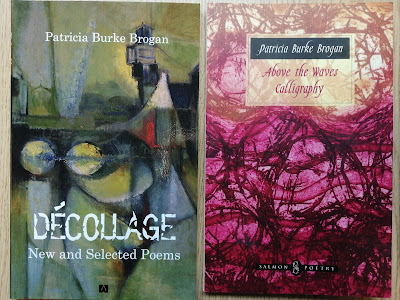 |
| Patricia Burke Brogan (c) Joe Shaughnessy |
The playwright, poet, and artist, Patricia Burke Brogan is to receive the Freedom of Galway City in a ceremony on Friday 20th May. Burke Brogan is widely regarded for her writing which always dared to speak of an often hidden Ireland, and which through poetry or the stage, gave presence and voice to neglected and marginalised women’s voices. The Patricia Burke Brogan archive, containing annotated drafts and scripts of her plays, notes on her writings, correspondence, programmes, posters and press cuttings about her work from Ireland and around the world, along with other collected items, is deposited at the NUI Galway Library Archive.
Burke Brogan’s most
well-known play is Eclipsed, which opened on 11 February 1992 in Galway,
produced by Punchbag Theatre Company. The play is framed by a present-day
prologue and epilogue, the play is set in 1963 in a convent laundry at St.
Paul's Home for Penitent Women in Killmacha, Ireland. Eclipsed
explores the practice of making pregnant and unwed Irish mothers work as
'penitents' in church-run laundries. Supervised by nuns who regarded these
women as mindless vessels of evil, the women were treated as virtual slaves and
their infants were forcibly put up for adoption.
 |
| Programme from Eclisped, 1992, Burke Brogan Archive, NUI Galway Library Archives |
Following its initial run in Galway the play toured to Project Arts Centre, Dublin and the Richard De Marco Gallery Theatre, Edinburgh. Recent Irish and international revivals were produced by Mephisto Theatre Company at the Town Hall Theatre, Galway in 2013, and later international productions include at the Spiegeltheater performance season in Belgium in March 2015. The play had its American première at the Worcester Forum Theatre in 1994 and was also later produced at the Seattle Fringe Festival in 1995 at the Irish Rep Theatre in New York in 1999. Eclipsed won a prestigious Fringe First award at the Edinburgh Festival in 1992 as well as being nominated for numerous awards at the Los Angeles Are Theatre Awards 1995. Her poetry has been widely published, with volumes including Above the Waves/Calligraphy (1994) published by Salmon Press.
Notes by Burke Brogan within her
archive at NUI Galway state:
Under double
lock in pious laundry-cages, the “fallen women” of Ireland, unmarried mothers,
who had broken the Sixth and Ninth Commandments, washed the stench from our
clothes. Betrayed by lovers, signed in by parents, the women were also separated
from their children, who were either taken for adoption or enclosed in
industrial schools. In the laundries, the only shelters available to the
penitents, they lived a Spartan and loveless existence. Those who became
institutionalised remained inmates for life and buried in nameless graves.
In 1990, when
the Galway Magdalen Laundry building was being demolished, Burke Brogan wrote a poem
entitled Make Visible the Tree. A section
of the poem together with a limestone sculpture of a Magdalen Woman were
unveiled by the author with the sculptor Mick Wilkins on International Women’s
day in Galway in 2009. In the poem Burke Brogan wrote:
This
is the Place of Betrayal.
Roll
back the stones
behind
madonna blue walls.
Make
visible the tree.
Burke Brogan has
long standing links with the University. She was part of the then U.C.G.
Writers Workshops, which brought together leading contemporary Irish writers
for talks and literary workshops, along with Thomas Kilroy, John McGahern, and
others. In 2015 Burke Brogan was awarded an honorary degree by NUI
Galway for her contribution to the Arts.#
 |
| L - R, Charlie Byrne, Professor James Browne, Patricia Burke Brogan pictured at NUI Galway on the occasion of Honorary Conferring in 2015. |
Other materials collected within the Burke Brogan archive include an annotated script for another play, Stained Glass at Samhain (Sister Luke’s Story), first performed at the Town Hall Theatre, Galway in 2002. Set at Halloween in the1990s, the play depicts Sister Luke, a former Mother Superior of the nearby Magdalen Laundry, and who returns to her convent, as the convent buildings are about to be demolished to make way for new apartments.
The memory of
Sister Luke’s life, within the Laundry and of her own reflections, are explored
within the play. Playwright Thomas Kilroy, speaking at the launch of the
publication of the play at the Town Hall Theatre Galway, said “It is a
wonderful thing to come across a truly visionary play, a poetic play and a play
which used the stage in a very interesting kind of way... I found it very moving
and I was even more moved by the silence, the fact that they were talking about
those unknown, unrecognised, unnamed graves.”
 |
| Excerpt from archived annotated script of Stained Glass at Samhain. Patricia Burke Brogan Archive, NUI Galway |
Speaking at the launch of Burke Brogan’s Memoir with Grykes and Turloughs in 2014, Sabina Higgins commented in her speech, a copy of which is in the archive, that “Patricia emerges as a renaissance woman. The breath of her knowledge and achievement is no many branches of life is both wonderful and impressive.” The archive is a richly detailed insights into one of Galway and Ireland’s most important contemporary writers. Today, students, and scholars of NUI Galway, as well as visiting international researchers and artists, from Brazil to the U.S.A., have consulted the archive and utilised it within new research and productions, ensuring the life’s work of Burke Brogan across the arts and to Irish social and cultural history, is continuing to reach new audiences, informing new generations, and to keep the voices and experiences in particular of the Magdalene women, alive and known to all who read her work.
The catalogue of the Patricia Burke Brogan Archive can be searched online here.
 |
| Covers of first editions of poetry books written by Patricia Burke Brogan |